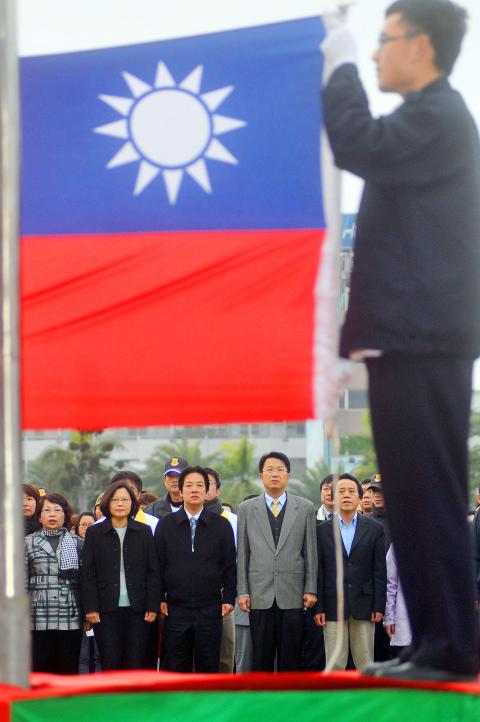In her New Year speech yesterday, Democratic Progressive Party (DPP) presidential candidate Tsai Ing-wen (蔡英文) said her wish was to win the Jan. 14 presidential election and promised to turn Taiwan into a country where solidarity and justice prevail.
“My fellow countrymen, I wish you a happy new year on the first day of 2012. I would also like to take this opportunity to offer my sincere pledge to make Taiwan a country of solidarity and justice,” she said at a flag-raising ceremony in Greater Tainan.
A collective upward dynamic and cohesiveness are desperately needed in Taiwan as people have lost their hope for the future and their trust in any political promise in the past three-and-a-half years, during which the government has malfunctioned, she said.

Photo: CNA
That is why she is determined to win the presidential election so her administration would be able to strive to regain “a sense of direction, the strength to march forward and people’s trust in politics,” Tsai said.
“That is the responsibility of our generation. And every one of you will be able to play a crucial part in the change for the better,” Tsai said.
With the presidential race moving into the final two weeks before the election, Tsai has been trying to consolidate support for her candidacy with extensive visits to various parts of the nation.
Meanwhile, at a press conference yesterday, former premier Su Tseng-chang (蘇貞昌), who serves as Tsai’s campaign chairman and ran as vice presidential candidate in the DPP’s failed bid in the 2008 presidential election, submitted the “three urges of respect.”
These are a call on Beijing to respect Taiwan, on the government to respect the people and on voters to respect their own free will.
The presidential election is the highest form of demonstrating the people’s collective will, Su said in Taipei, and China should refrain from any interference in the democratic process or threaten use of force against Taiwan.
In the lead-up to the election, Beijing officials have issued a number of official comments that made no secret of their support for President Ma Ying-jeou’s (馬英九) re-election bid and have threatened that the stability of cross-strait relations could be undermined if the DPP were to re-enter the Presidential Office.
The government should respect its people by maintaining administrative neutrality and preventing the use of vote-buying, Su said.
Su also urged voters to respect their right to vote and say “no” to vote-buying to enable Taiwan’s democracy to deepen.

The Taiwanese passport ranked 33rd in a global listing of passports by convenience this month, rising three places from last month’s ranking, but matching its position in January last year. The Henley Passport Index, an international ranking of passports by the number of designations its holder can travel to without a visa, showed that the Taiwan passport enables holders to travel to 139 countries and territories without a visa. Singapore’s passport was ranked the most powerful with visa-free access to 192 destinations out of 227, according to the index published on Tuesday by UK-based migration investment consultancy firm Henley and Partners. Japan’s and

NATIONAL SECURITY THREAT: An official said that Guan Guan’s comments had gone beyond the threshold of free speech, as she advocated for the destruction of the ROC China-born media influencer Guan Guan’s (關關) residency permit has been revoked for repeatedly posting pro-China content that threatens national security, the National Immigration Agency said yesterday. Guan Guan has said many controversial things in her videos posted to Douyin (抖音), including “the red flag will soon be painted all over Taiwan” and “Taiwan is an inseparable part of China,” while expressing hope for expedited “reunification.” The agency received multiple reports alleging that Guan Guan had advocated for armed reunification last year. After investigating, the agency last month issued a notice requiring her to appear and account for her actions. Guan Guan appeared as required,

Japan and the Philippines yesterday signed a defense pact that would allow the tax-free provision of ammunition, fuel, food and other necessities when their forces stage joint training to boost deterrence against China’s growing aggression in the region and to bolster their preparation for natural disasters. Japan has faced increasing political, trade and security tensions with China, which was angered by Japanese Prime Minister Sanae Takaichi’s remark that a Chinese attack on Taiwan would be a survival-threatening situation for Japan, triggering a military response. Japan and the Philippines have also had separate territorial conflicts with Beijing in the East and South China

A strong cold air mass is expected to arrive tonight, bringing a change in weather and a drop in temperature, the Central Weather Administration (CWA) said. The coldest time would be early on Thursday morning, with temperatures in some areas dipping as low as 8°C, it said. Daytime highs yesterday were 22°C to 24°C in northern and eastern Taiwan, and about 25°C to 28°C in the central and southern regions, it said. However, nighttime lows would dip to about 15°C to 16°C in central and northern Taiwan as well as the northeast, and 17°C to 19°C elsewhere, it said. Tropical Storm Nokaen, currently